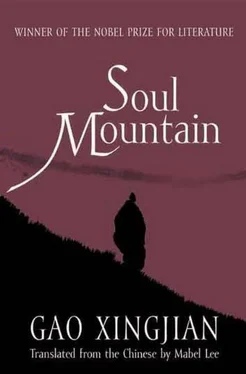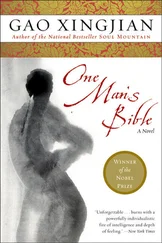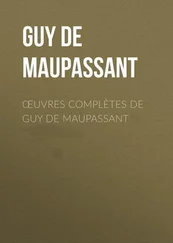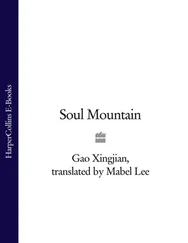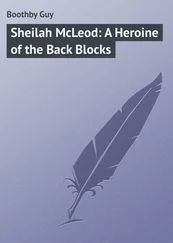After leaving the city we travel down a potholed highway obscured by a dust haze thrown up by the stream of trucks and cars crammed with people — there are cadres and workers from the prefectural offices, as well as people from enterprises, schools and factories, all hurrying to join in the fun. This former Miao king who is now the prefectural head is probably in charge of some ceremony. The cadre next to the driver has the window down and is shouting out to cars to make way. We keep overtaking and pass through many stockades as well as two county towns but finally come to a stop because a large number of vehicles is jamming the road in front of the ferry crossing. A big car has failed to negotiate the ferry and its front wheels have slipped into the water. Also stuck in the morass of cars is a splendid black Volga which they tell me is the car of the party secretary of the prefectural committee and which appears to be carrying senior provincial officials. Large numbers of police bark orders and directions endlessly and after an agonizing hour or so the big car is partially pushed into the water to clear enough space to put down the plank. Our little van follows close behind the Volga and immediately after the police stop all the cars. The ferry winds up the cables and leaves the shore.
At noon this mighty contingent arrives at the Miao stockade on the broad banks of the Qingshui River. In the blazing sun the clear water sparkles with a dazzling brilliance. Both sides of the highway are awash in colour, teaming with the floral parasols and high silver head ornaments of the Miao women. Alongside the highway is a new two-storey brick building which houses the government offices, then all the way down to the river are the wooden houses on high pylons of the Miao people. Below the veranda of the government building a seething mass of heads, inlaid with round floral parasols and bamboo hats shiny with tung oil, slowly moves between the rows of white canopied stalls on the river-bank. A large number of dragon boats, heads rearing and decked with red streamers, glide about on the clear, green, flat surface of the river.
Following close behind the prefectural head, I slip into the building past the saluting police on guard and receive the warm reception accorded to the cadres in the group. Young Miao women in full festival attire bring basins of hot water and present each of the guests with a brand new scented hand towel to wash their hands and faces. The women, who all have bright eyes and white teeth, then present us with cups of fragrant new season tea, just as they do to visiting officials on the news. I ask the cadre in charge of reception if they are performers from the prefectural dance troupe brought in for the occasion. He tells me they are exemplary middle school students from the county town with weeks of training by a special group of the county people’s committee. Two of them put on a performance of Miao love songs. The senior officials make some encouraging comments and then everyone is escorted to their seats in the dining hall. Food and drink have been laid out, there is beer and soft drinks, and only napkins are missing. I am casually introduced to the party secretary and to the town head, who both speak some Chinese, and they shake hands with me along with all the others. Everyone praises the culinary skills of the chef sent by the county administration, and as he announces each of the dishes he clasps his hands and bows humbly. Afterwards we wash our hands and faces again and drink more tea. It is two o’clock in the afternoon and the dragon boat races should be starting soon.
The town head and the party secretary lead the way down the stone steps through a narrow lane crowded with people. Some Miao women in multi-pleated skirts who have come from elsewhere are doing finishing touches to their dresses in the shade of the pylon houses. At the sight of this group with a police escort they stop looking in their little mirrors and combing their hair to stare curiously. The group filing past also stares at the several kilos of various kinds of silver headdress, silver necklets and silver bracelets they are wearing and for a while it is hard to tell who is more keenly scrutinizing who.
Chairs and benches have been arranged on a platform on pylons by the river. It is surrounded by civilian police. Once seated, everyone is given a small floral parasol similar to the ones the young Miao women carry, but held by these cadres they are decidedly not pretty. The blazing sun is slanting but even with a parasol I sweat profusely, so I go down to join the bustling crowds by the river.
The scent of tobacco, pickles, sweat and the acrid smell from the tables of beef, mutton, pork and fish all waft up in the intense heat. The stalls sell things from department store cloth to little snacks like toffee peanuts, bean-paste jellies and melon seeds, and there is a lively din of bargaining, flirtatious laughter and children weaving in and out of the crowds.
I am easily carried in the tide of people down to the river until I am almost treading in the water and am forced to jump into a small boat tied to the shore. Up ahead is a dragon boat made from a hollowed out tree trunk. To preserve the balance a shaved branch is fitted at the waterline on the side. In the boat, facing the same direction, are thirty rowers, all dressed identically in indigo-blue trousers and jackets with pleats shining from the ox bone fat in the cloth and small hats of intricately woven bamboo. Each of them is also wearing sunglasses and a shiny metal belt. At the middle of the boat is a boy dressed up as a girl. He is wearing silver neck rings and a headdress and from time to time he strikes the club-gong hanging in front of him. At the prow of the boat a large, carved wooden dragon rears its head. It is strewn with little flags and red cloth streamers, and hanging on it are also quacking, honking live ducks and geese.
There is a burst of firecrackers and people bearing sacrificial objects arrive. The captain at the prow beats the drum and gets the rowers to stand up. A middle-aged fellow with a vat of liquor in both hands walks straight into the thigh-deep water without rolling up his trouser legs and presents bowls of liquor to the crew. The men in sunglasses quaff down the liquor as they sing their thanks and with a flourish rinse the dregs in the river.
An old man runs into the water along with some men carrying a live pig. The terrified animal is hanging upside down by the legs and its frantic squealing heightens the drama and excitement. The vat of liquor and the pig are then put into the small boat containing sacrificial objects tailing the dragon boat.
It is almost five o’clock when I return to the viewing platform. The river resounds with drums which start up in one place and subside in another, at times intense and at others slow. The dragon boats are playing with one another and don’t look as if they are about to race, a few boats will bunch together and then suddenly separate. The people on the viewing platform start getting impatient. First they summon the prefectural committee, then they send word to the cadres of the sports committee to say there is advice from above that each participating dragon boat is to be awarded one hundred yuan in cash as well as coupons for two hundred catties of grain. Some time later the sun is about to set, the heat has abated, and there is no need for the parasols. However, the dragon boats still haven’t started to assemble and there is no sign of a race starting. At this point word arrives that there will be no race today and people would have to go thirty li downstream to another Miao stockade tomorrow. There is immediately a stir on the viewing platform and the decision is made to go back.
The procession of vehicles head to tail on the highway starts to move off. Ten minutes later it has vanished in a cloud of yellow dust and on the road there remain only the crowds of young Miao tourists who continue to flock in. It seems that many of the highlights of the festival take place at night.
Читать дальше
Конец ознакомительного отрывка
Купить книгу
